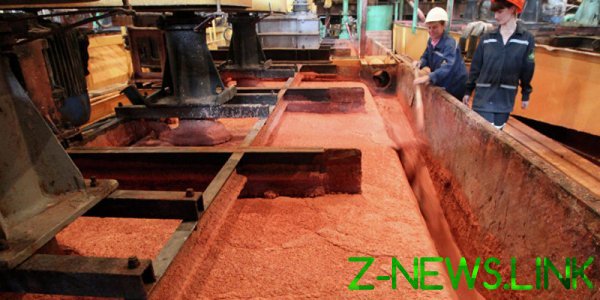
The commissioning of the new potash plants – Nizhyn and Petrikov mining and processing plants, no doubt, will further strengthen Belarus ‘ position in the global potash market. What are the benefits the result of Belarus? And will she be able to influence prices in the potash market?
Belaruskali remains today the only producer of potash in Belarus. Exporter of Belarusian potash fertilizers in 2013 is JSC “Belarusian potash company” (BPC). Over the years, the export geography of the company amounted to approximately 140 countries, and the share of CCB in the world export of potash fertilizers by 2018 made up of 20.5%.
According to preliminary data of the International Association of fertilizer producers (IFA), total world production of potassium chloride in 2018 reached 68.5 million tons, While 23.5 million tonnes were produced in Canada, 12 million tons in Belarus, and third place went to the Russian producers – Uralkali and EuroChem with a total production capacity of 11.5 million tons.
If we consider the performance of individual companies, now “Belaruskali” is the world’s second largest by volume after the canadian Nutrient, and BPC is a world leader in the export of potash fertilizers.
Belarus is increasing its potash capacity
The fact that the resource base of Belarus in first term will grow significantly obvious.
Over the past four years “Belaruskali” only through modernization of existing production has increased capacity by more than 3 million tonnes to 12.9 million tonnes. “Created entirely new production – an environmentally friendly, waste-free, cost-effective, closed-loop. The modernisation of offices sylvinite processing plants of all four mine groups of enterprises, reconstruction of a number of other objects on primary and secondary production. While implementing projects, recoupment of which an average of three years”, — said General Director of “Belaruskali” Ivan Golovaty corporate edition “Kalischuk Salgirka”.
In July 2019, Belaruskali and the Chinese company “Migao Corporation” complete the construction of a plant for the production of potassium nitrate. The production capacity of the new plant will be 160 thousand tons per year potassium nitrate and 124 thousand tons NРK of granular fertilizers per year.
In 2018 Krasnoslobodsky mine (he provides a second sylvinite ore beneficiation plant Belaruskali) thanks to the upgrade increased design capacity from 6 million tons to 8 million tons.
In August 2014, Belaruskali has started construction of the Petrikov Mining in the Gomel region with a capacity of at least 1.5 million tonnes of potash per year. The first stage is scheduled for December 2019, the output at full capacity by 2021.
In may 2019 “Belaruskali” started construction Tarasenkovo mine design capacity for the extraction of ore about 8 million tons with prospect of increase up to 9 million tons. This project aims to support the resource base of the third mine group of “Belaruskali”. For this power the third mine is planned to increase by at least 11 million tonnes of mined ore.
All these major projects are evidence that Belarus is interested in the speedy increase in the production of potash. The desire of the Belarusian authorities is clear: potassium can be a kind of monetary magic wand that allows the budget to offset part of the expected losses from the tax maneuver in the oil industry.
Plus project “potash Mecca”
In this context, the strategic nature has a new potash project in Belarus — Nizhyn GOK, the construction of which has been the company “Slavely” Russian businessman Mikhail Gutseriev.
Briefly recall the background of this project. In October 2011, the British company JMC Global Energy plc owned by M. Gutseriev signed investdogovor with the government of Belarus on construction of a new mining and processing plant on the basis of the Starobin Deposit. New potash company M. Gutseriev called “Slavic potassium” — apparently by analogy with “Slav-oil”, which he directed in the status of Russian-Belarusian company. Under the terms of the investment a new potash plant with a capacity of 1.1 million tons were to be built until 2017. But Gutseriev wanted to implement it faster. “We don’t think we need to wait. Must be done before 2015,” — said the businessman.
However, he stressed that if there is demand, then the company will be able to increase the capacity of the plant up to 5-10 million tonnes of potash per year. M. Gutseriev said that. this project could make Belarus “potash Mecca”.
However, on the background of the crisis in the potash market with the implementation of the project had to wait. Later, the cost of construction of the Nezhin MINING was estimated at $ 2 billion, the power is determined in volume of 2 million tons.
In may 2015, the Finance Ministry of Belarus, the State China development Bank, Belarusbank and “Slavely” signed a Memorandum, which involve an agreement of loan of 1.4 billion dollars for the construction of the Nezhin Mining. Interest rate 4% per annum, repayment period is 14 years. The first payment was supposed to begin after 5 years. Guarantee for the Chinese loan provided by the government of Belarus. Another 600 million dollars “Slavely” planned to invest in the project independently.
Then M. Gutseriev has declared readiness to start construction of the GOK in the summer of 2015 and be finished within three years. Later, however, the commissioning of the potash plant was assigned to 2022. And in early 2019, it became known that “Slavely” addressed the Belarusian government with a proposal to adjust investdogovor and to shift the timing of input of object in operation due to “a later development investment.” Prime Minister of Belarus Sergei Rumas said after the meeting with Mikhail Gutseriev in April 2019 noted that “there are no obstacles to the investor in the stated timeframe, the facility was put into operation”. Himself M. Gutseriev told journalists that the mine is planned to be completed by 2023.
Two potash player of Belarus is planning to act in concert
President of Belarus Alexander Lukashenko at the meeting with Mikhail Gutseriev July 9, drew particular attention to the importance of consistency in the implementation of Belarusian potash fertilizers in the future.
“It is very important that we glued relationship “Slavolia” with the Belarusian potash company and the market you went in concert. After we introduce Nizhyn plant, and after we introduce on the river (we have already opened the enterprise), we will take almost the first place for the extraction of potash fertilizers in the world. That is, we will have the opportunity to dictate the terms of implementation,” — said Alexander Lukashenko.
According to him, “I would like to develop in this area, as once we have agreed with you”.
After the meeting with A. Lukashenko the President of the Board of Directors of the company “Slavely” M. Gutseriev told journalists about the progress of the construction Nagisacho GOK, “I Think next year will complete the construction of mines. In 2.5 years, to 2023-mu, finish the construction of the plant and will give the first production,” he added.
The TV channel ONT M. Gutseriev said that while the construction of the complex is with a slight lag. “This is due to some problems of water drainage. In summer, the builders are going to catch up, and by the end of the year to learn about 400 million dollars of investment. Same — next”, — he said.
“This is major construction and expensive project, but we know exactly what we have him for 8-10 years to recoup… the Project will give a good profit, I hope. In 2024-m you will receive an additional $ 600 million”, — said M. Gutseriev.
It is no coincidence that M. Gutseriev called potash project Luban “new export kopilochku” for Belarus. “This is a good business for 100 years. It will always be and I will not leave”, — he said. “There are few countries where there are reserves of potassium. Belarus has virtually no oil, but fortunately, it has potassium. We must build a second plant. To go into new markets, reduce the cost of production and thus increase export revenues,” — said the Russian businessman to journalists on 9 July.
Agreement on the common work of the two producers of potash, about A. Lukashenka said at the meeting with Mikhail Gutseriev, have been identified in the investment agreement under the project of construction of the Nezhin Mining. Channel exports “Slavolia” in accordance with the agreement must be CCL.
“In Alliance with “Slavolia” we see certain synergies that can be achieved in production and logistics, and trade spheres,” said the BPC Director General Yelena kudryavets in September 2017 in an interview with BELENKO.
M. Gutseriev still in the early stages of the project have also stated that they sell their products in foreign markets, the new plant will be in BKK. Rhetoric M. Gutseriev also does not allow us to doubt. “We have an agreement that when we’re out for the completion, sign all necessary documents. Now there is a framework agreement that we are moving in unison” — quoted by Russian businessman recently Learned.
Pitfalls for potash alliances
However, despite the expected synergies from the cooperation of “Belaruskali” and “Uralkali”, there is a major pitfall that potential partners have to overcome before you start working together. We are talking about existing in the world market of norms of Antimonopoly regulation that must be respected by the players, who were planning to create any kind of alliances.
In particular, the long process of merger of two major canadian producers Potash Corp and Agrium, with the result that appeared on the market a powerful player company Nutrien, bringing together not only the production capacity of potash fertilizer in the United States and Canada, but also for the production of nitrogen and phosphate fertilizers, were far from easy.
Company Nutrient had to go through the procedure of obtaining permission for merger in countries such as Canada, Russia, India, Brazil and the United States. Moreover, for the approval of the Ministry of Commerce of China companies had to sell their stakes in some companies — SQM, Arab Potash and ICL. But in the end Nutrien surpassed the volumes of all competitors and became the largest in the world.
The new philosophy of the potash market will dictate prices
However, it should be emphasized that the Belarusian authorities ‘ capacity potash capacity should not become an end in itself. The key task that stood in front of a producer and exporter of potash fertilizers to maximize returns on exports. In this case, you should consider the features of a modern potash market, which dictate new rules of the game.
As you know, potash is not traded on commodity exchanges: the sellers agree annually on the supply of potassium chloride with key customers in China and India on the supply of these prices set the tone for the world market.
Attempts to artificially set prices in the potash market met stiff resistance. For example, in September 2008, the U.S. potash consumers brought civil antitrust complaints in the us Federal courts against major suppliers of potassium in the United States. In the complaint it was alleged that producers of potassium chloride from 1 July 2003 set prices for its products in violation of us Sherman act. This antitrust lawsuit led to a trial, which lasted almost 5 years, until finally an agreement was concluded.
And in recent years the global potash market has undergone major changes, which changed the philosophy of this market. Now it is based on healthy competition leading players, which leads to a natural balance and to a gradual and harmonious growth of the market.
Key players in the potash market today are Belaruskali-BPC, the canadian Nutrient manufacturers and Mosaic, an Israeli company ICL and APC of Jordan, the German company K+S and the Russian Uralkali. The behavior strategy on the market each of these companies is building on their own, as the basis of the current conjuncture and long-term forecasts. The degree of responsibility of the behavior of the major players in the market, experts estimate including on indicators such as changes in production volumes and exports in the complex market situation and on the eve of the signing of major contracts with India and China, when all producers of potassium chloride, it is important to balance the market.
It is obvious that now the world potash market is characterized by high degree of concentration and it continues to grow. Two years ago there was a merger of the largest players in the potash market – Potash Corp and Agrium in 2018 in the Russian potash market has a new player — group “EuroChem” businessman Andrey Melnichenko. Although the company’s CFO Andrey Ilyin recently in a telephone interview with Reuters said that the company sees itself as a significant market participant no earlier than 2020, this new player should take into consideration now.
Not to mention the involvement of JSC “Akron” in the subject of potash. The company finances the construction of a new mine in the Perm region and apparently also plans to take its place in the potash market.
It also expands the capabilities of the already known players of the potash market. An example might be launched in 2017, the mine Bethune in Canada, owned by the German company K+S. According to forecasts, in 2019, this mine may reach a capacity of 1.7-1.9 million tons, which will allow K+S to optimize supply logistics in certain regions. In the longer term, can move forward and develop Jansen Deposit in Canada, which leads the BHP Group.
Thus, producers of potassium chloride in all regions and not only in Belarus, increase capacity and develop business in many areas, resulting in the potash market is gaining new momentum.
Collectively, according to the editor of the Argus Potash Ewan Thomson, the capacity of the potash players by 2031 will increase by 23%. As a result, the market will be 109 million tons of potash fertilizers with the demand of 96 million tons.
Experts say that in terms of overproduction and increasing competition in the market is unlikely any player, even the largest, will be able to dictate prices to the market. Most likely, the market will be dominated by the philosophy of rational volumes of production and sales.
A decisive competitive factors in the conditions of increasing competition in the market for potash fertilizer will be items such as the cost of raw materials and energy, logistics of delivery of fertilizers to major consumers and the ports of shipment, the efficiency of transshipment facilities. It is from these factors primarily will depend on the efficiency of export of potash fertilizers.
© 2019, paradox. All rights reserved.





